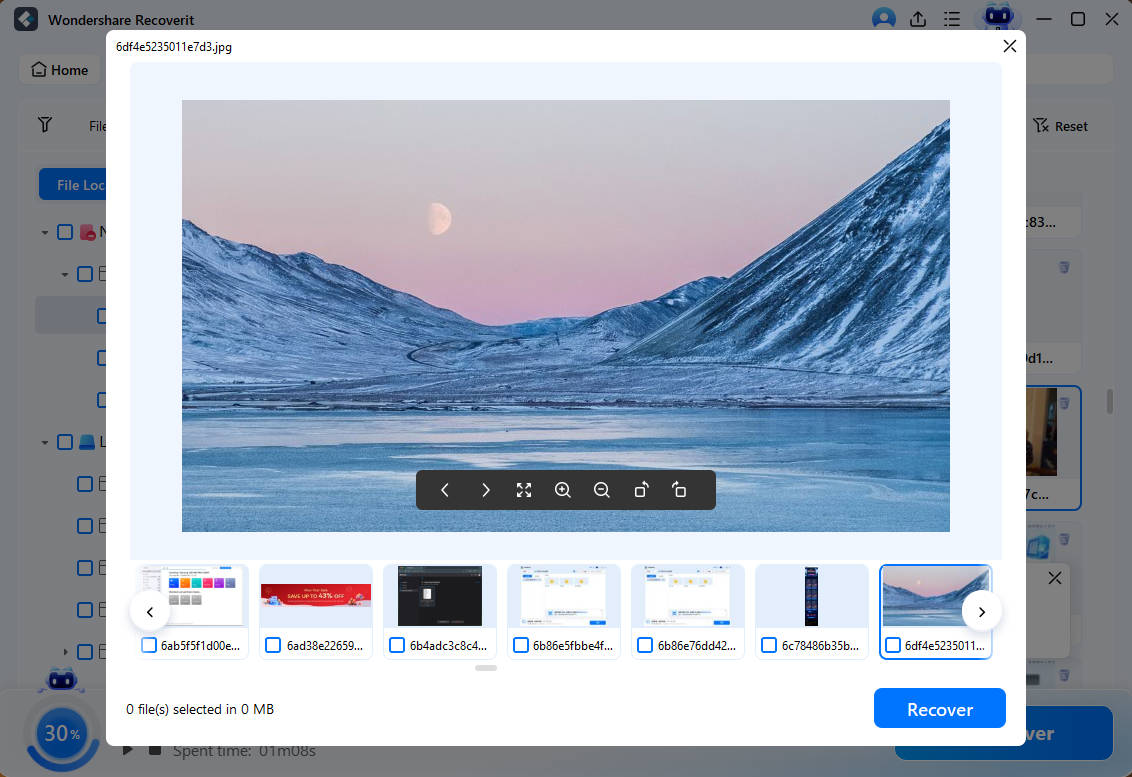We rely heavily on external storage devices like LaCie hard drives to safeguard our precious data. Whether it's critical work documents, irreplaceable photos, or cherished videos, these devices become lifelines. But what happens when disaster strikes? Accidental deletions, formatting errors, or sudden drive failures can leave us in a state of panic. If you've found yourself facing this terrifying scenario, you need to find the right solution.
In this article, we will guide you through the process of LaCie drive recovery. We will discuss proven methods such as using a specialized data recovery tool, File History on Windows, and Time Machine on Mac.
In this article
Can I Recover Data from LaCie External Hard Drive
Yes, data recovery from a LaCie external hard drive is possible in many cases. Whether you've accidentally deleted files, formatted the drive, or it's malfunctioning, there are methods available to help you retrieve your lost data. It is crucial for users to act promptly and employ appropriate recovery methods to maximize the chances of retrieving their valuable data.
The following tables highlights the key differences between the LaCie hard drive recovery methods discussed here:
| Method | Scenario | Success Rate |
| Wondershare Recoverit | Accidental deletion, formatting, file corruption, virus attacks | 🥇 High success rate for even the most severe data loss scenarios |
| File History on Windows | Accidental deletion, system crash | Limited recovery options and success rate for severe data loss |
| Time Machine on Mac | Accidental deletion, file corruption, system failure | Moderate success rate for most data loss scenarios on Mac systems |
How to Perform LaCie Hard Drive Data Recovery
Method 1: Use a Data Recovery Tool: Recoverit
When you try to find the right tool to ensure effective and comprehensive LaCie hard drive recovery,Wondershare Recoverit is a reliable choice.
Recoverit ensures that nearly all types of data, including documents, photos, videos, and audio files, can be restored in your LaCie external hard drives. Additionally, its deep scan feature meticulously searches for lost or deleted files, maximizing recovery chances. Its user-friendly interface brings an effortless recovery process for each user.
Here is how to ensure a successful LaCie hard disk recovery with Recoverit:
Step 1: Launch Recoverit on your computer. Select the “External Devices Recovery” mode to target your LaCie drive. Ensure that your computer recognizes the LaCie hard disk and select it for scanning. Initiate the recovery process by clicking the “Start” button.

Step 2: An all-around scan will be launched on the external storage media. Wait a few minutes to finish the scanning. During the process, you can locate the targeted files and have the option to pause or stop it.

Step 3: Upon completion of the scan, a comprehensive list of recoverable files will be displayed. Preview the scanned files directly from the LaCie hard disk drive. Select the specific files you wish to recover and click the “Recover” button. Specify a destination folder for the recovered files and complete the recovery process.

Method 2: Use the File History Feature on Windows
File History is a built-in feature in Windows that allows you to back up and restore files on your computer, and is a proven method for LaCie drive recovery. You can easily recover data using this feature by connecting your LaCie external hard drive to your Windows PC and setting it up as the backup drive.
Step 1: Connect the LaCie hard drive to your computer using a cable, and navigate to the specific location on the external drive where the deleted files were previously saved.
Step 2: Right-click within the folder or drive and select “Properties” from the menu.

Step 3: Navigate to the “Previous Versions” tab in the Properties window.

Step 4: Select the desired files that you wish to recover and click the “Restore” button.
Method 3: Use Time Machine on Mac
Time Machine is a backup software application included in macOS that automatically creates backups of your files on an external hard drive. When you connect your LaCie external hard drive to your Mac and set it up as the Time Machine backup disk, you can easily restore data using this feature.
Time Machine creates hourly, daily, and weekly backups, allowing you to go back in time to retrieve specific versions of files. It offers a visually engaging interface that displays your files in a timeline, making it easy to navigate through backups.
Step 1: Connect your LaCie external hard drive to your Mac using a USB cable.
Step 2: Click on the Apple menu and select “System Preferences”.

Step 3: In System Preferences, click on “Time Machine”.

Step 4: Click on “Select Backup Disk” and choose your LaCie external hard drive as the backup disk.

Step 5: Turn on Time Machine by clicking on the switch in the Time Machine preferences. To recover files, click on the Time Machine icon in the menu bar and select “Enter Time Machine”.

Step 7: Select the items you want to restore and click on the “Restore” button to recover them to their original location on your Mac.
Troubleshooting: How to Fix Malfunctional/Unreadable LaCie External Hard Drive
Data loss in LaCie hard drive can often occur due to malfunctional or unreadable LaCie external hard drive. To ensure the functionality of hard drives and avoid data loss, you need to troubleshoot the problem effectively.
#1 Check Connectors and Cables
You can resolve detection problems associated with external hard drives effectively by addressing connectivity issues. It is crucial to ensure that the USB or Thunderbolt cable is securely connected at both ends to establish seamless communication between your external hard drive and computer.
In the case of a faulty cable, substituting it with a different one can aid in troubleshooting. Additionally, verifying the connection of the power adapter is indispensable to guarantee that the external hard drive is receiving sufficient power to operate flawlessly.

#2 Update Your Drivers
Updating the drivers for your external hard drive can help resolve compatibility issues and ensure that the device is recognized by your computer. The device manager is the central location to manage and update drivers for various hardware components.
Step 1: Go to the “Device Manager” on your computer.

Step 2: Locate the external hard drive in the list of devices.
Step 3: Right-click on the external hard drive and select "Update driver." Follow the on-screen instructions to update the driver.

#3 Assign Drive Letter Manually
Manually assigning a drive letter can help your computer identify and access the external hard drive correctly. Adding a new drive letter ensures that the external hard drive is uniquely recognized by the operating system, which can prevent conflicts and improve accessibility. This method is especially useful when the external hard drive is not showing up with its assigned letter.
Step 1: Go to the Disk Management tool on your computer.

Step 2: Locate the external hard drive in the list of disks.
Step 3: Right-click on the external hard drive and select "Change Drive Letter and Paths."

Step 4: Click on "Add," choose a drive letter, and click "OK."
#4 Fix Lacie Hard Drive Errors
Running a disk check using the chkdsk command in Windows as an administrator help you fix drive issues that might be causing detection problems. For macOS users, the Disk Utility's First Aid feature can help.
For Windows:
Step 1: Open Command Prompt as an administrator.

Step 2: Type "chkdsk /f X: "

Step 3: Press Enter and wait for the process to complete.
For macOS:
Step 1: Open Disk Utility.

Step 2: Select your LaCie external hard drive from the list on the left.
Step 3: Click on "First Aid" and then "Run" to scan and repair any errors on the drive.

#5 Format LaCie External Hard Drive
Formatting the LaCie external hard drive help in situations where the drive is not being recognized by the computer due to potential file system errors or corruption. Formatting your LaCie external hard drive is a drastic step that can erase all your data. Therefore, you should back up any important data stored on the drive.
For Windows:
Step 1: Connect the LaCie external hard drive to your computer via USB cable.
Step 2: Open “Disk Management”.

Step 3: In the Disk Management window, locate your LaCie external hard drive. Right-click on the drive and select "Format."

Step 4: Follow the on-screen instructions to choose the file system (NTFS is recommended for Windows) and allocation unit size, then click "OK" to begin formatting your LaCie external hard drive.
For Mac:
Step 1: Connect the LaCie external hard drive to your Mac using a compatible cable.
Step 2: Go to Applications > Utilities and open “Disk Utility”.

Step 3: In Disk Utility, select your LaCie external hard drive from the list of devices on the left-hand side.
Step 4: Click on the "Erase" tab, choose a name for the drive, select the desired file system, and click on the "Erase" button to format the LaCie external hard drive.

Conclusion
Losing data from your LaCie external hard drive can be a major setback, but don't despair! There are various methods available for LaCie external hard drive data recovery. You can try a powerful data recovery software like Recoverit, leverage the built-in Windows File History, or utilize macOS Time Machine. To troubleshoot malfunctioning or unreadable LaCie external hard drive, you can try methods like checking connectors and cables, updating your drivers, assigning drive letter manually, fixing LaCie hard drive errors, and formatting LaCie external hard drive.
Try Wondershare Recoverit to Recover LaCie Hard Drive Data

FAQ
How to factory reset LaCie drive?
To factory reset a LaCie drive, connect it to your computer and open “Disk Utility” (Mac) or “Disk Management” (Windows), and locate the LaCie drive and select the option to format or erase the drive. Then, follow the on-screen prompts to complete the factory reset process, which will erase all data on the drive and restore it to its original settings.How do I fix my hard drive recovery?
To fix hard drive recovery, use data recovery methods such as using Recoverit, use the File History Feature on Windows, or Time Machine on Mac, and troubleshooting techniques to address data loss and drive malfunctions effectively. Employ a systematic approach to diagnose and fix underlying issues causing data loss or drive malfunctions.How do I get my LaCie hard drive to show up?
To make a LaCie hard drive show up, troubleshoot by checking connectors, updating drivers, assigning a drive letter, running diagnostics, and formatting if needed. Take systematic steps to address visibility issues and ensure the LaCie hard drive is recognized and accessible within the system.What is the best format for LaCie drive on Mac?
For optimal performance on Mac, format a LaCie drive as macOS Extended (Journaled) for compatibility and integration with Time Machine backups. Choose this format for robust support of large file sizes and seamless backup functionality with Time Machine on Mac systems.


 ChatGPT
ChatGPT
 Perplexity
Perplexity
 Google AI Mode
Google AI Mode
 Grok
Grok






















